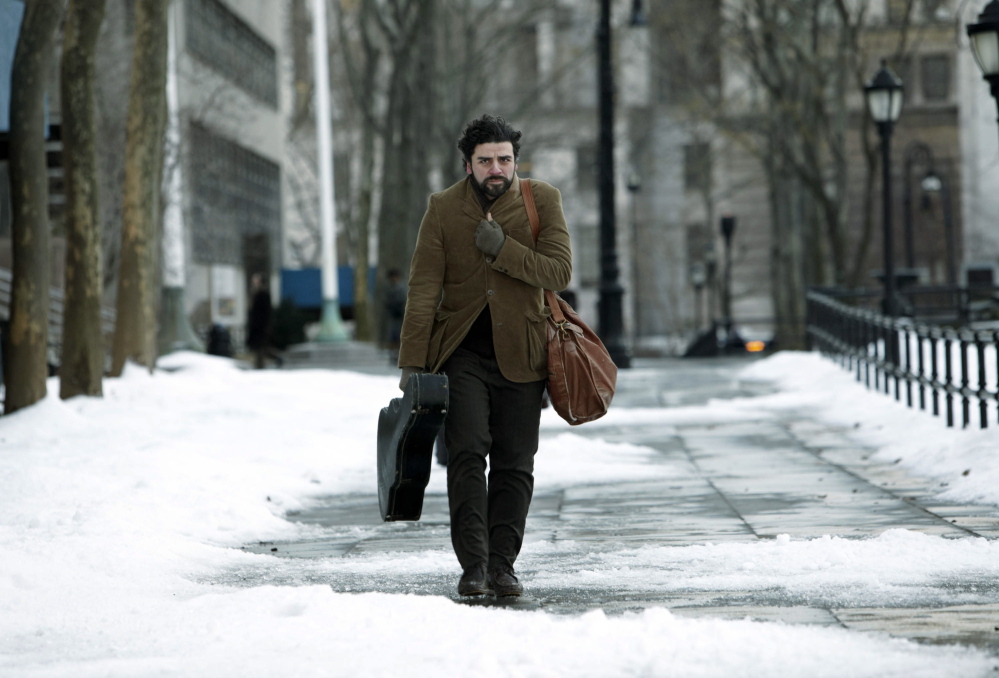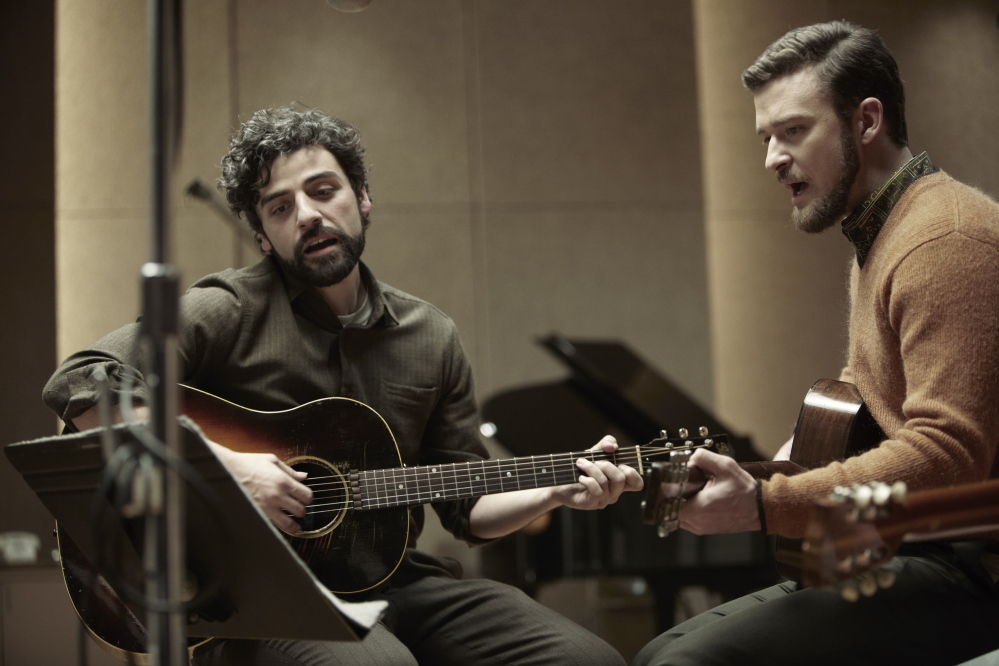Oscar Isaac figures he owes his big break, taking the title role in the Coen brothers’ “Inside Llewyn Davis,” to two things.
Since the filmmaking Coens, Joel and Ethan (“Fargo,” “True Grit,” “A Serious Man”), aren’t known for giving their actors a lot of direction in finding the quirky, offbeat characters they must play, Isaac had to seek the brooding, grieving Llewyn – a struggling folk singer in 1960s Greenwich Village – on his own.
“Charles Bukowski’s poem ‘Bluebird’ starts out, ‘There’s a bluebird in my heart that wants to get out. But I’m too tough for him, I say, ‘Stay in there, I’m not going to let anybody see you,’” Isaac, best known for a chewy supporting role in “Drive,” says. “Coming from a guy as unsentimental as Bukowski, I found it very moving. Llewyn’s ‘bluebird’ is his music. It’s the only time he softens, lets us see the softer guy beneath this tactless, hard exterior.”
And the other key to his landing the role? “Crossroads.” Not the famous blues song by Robert Johnson – he’s talking about the 1986 film.
“I started off on classical guitar because I had seen ‘Crossroads,’ with Ralph Macchio and Steve Vai. It’s ‘The Karate Kid with Guitars!’,” Isaac says, laughing. “At the end, the classical guitarist beats the rock god (Vai) in a shredding contest, so I learned classical guitar because I thought that would teach me how to shred. It took me six months to figure out, ‘only in the movies.’ So I went straight for Metallica, after that.”
Isaac cackles at the memory. But it served him well when he angled for and got the audition for “Inside Llewyn Davis,” which has him singing and performing classic tunes from the folk music repertoire – “Hang Me, Oh Hang Me,” “The Shoals of Herring” – performances captured in full, in long takes and in close-up. No faking it, there. A guy who’s been singing and playing the guitar since he was 13, Isaac had the inside track on Llewyn.
“I grew up listening to Dylan, Cat Stevens and Simon & Garfunkel. I had never heard of this strange transitional period, between Woody Guthrie and Pete Seeger and when Dylan showed up (in 1961). All new music to me, a very different era. I had a lot to learn.”
In the late 1950s and early’ 60s, folk music enjoyed a stretch in the national spotlight. The McCarthy Era was over, so formerly blacklisted performers like Seeger and his group The Weavers turned up on TV. New stars emerged and their records sold well enough that record companies even started manufacturing folk groups such as Peter, Paul and Mary.
“Everybody was descending on the Village,” Isaac says. “The pulse was quickening. All these people were trying it out, roots music was in and everybody was already turned on to the Beat poets.
“Folk singers started out as the performers you brought in to clear the room, between poets.”
He’s joking. Folk musicians do that, especially laconic, deadpan performers of the Llewyn Davis type.
“I see him as inspired by Dave Van Ronk, who had been on the scene forever, this kid from the borroughs. Dave wasn’t ‘authentic,’ didn’t invent this Woody Guthrie mythology for himself and change his name the way Dylan did. And that’s who Llewyn is, just a Queens guy playing and loving folk music.”
Isaac, 33, is a native of Guatemala who grew up in Miami, an alumnus of Juilliard and an actor on the rise, with four films in the can, ready for release. His exotic, dark good looks landed him supporting parts in all sorts of films, from “Body of Lies” to “Robin Hood” over the past 10 years. He was Joseph in “The Nativity Story,” and first showed off his musical talents on the big screen in the little-seen but well-received high school reunion drama “10 Years,” playing a pop star.
He’s earning breakthrough reviews as Llewyn Davis, with Slant Magazine praising his “eloquently beleaguered” take on the character and Screen Daily noting his “charm and subdued anger” in the part. The character’s internal struggles are what play out on the screen, his bitterness at not breaking out as a star, his irritation at those who are, his guilt over family and the singing partner he lost. The performance, Isaac says, was dictated by the simple act of camera placement.
“The cameras … were just 4 inches from my face. The Coens don’t work with a lot of long lenses. When it’s that close, the instinct is to underplay it. You don’t externalize much. You just ‘think it.’ You rely on them to provide the context that tells you what Llewyn’s thinking.”
Not every role is going to showcase him like this. Not every film will require the ability to hold a close-up while playing and singing a folk song. But Isaac figures the things he takes from “Llewyn Davis” will serve him in great stead in years to come. And not just in the movies.
“It’s changed my life, changed my acting, changed my musical repertoire,” he says of the film. “I think this has opened up a lot of doors because that Coens stamp of approval goes a long way in this business.
“But aside from that, I have a whole new set of songs I could take out to a coffeehouse, or go on the road with. It might be nice to take these songs out and play them for people.”
Send questions/comments to the editors.




Success. Please wait for the page to reload. If the page does not reload within 5 seconds, please refresh the page.
Enter your email and password to access comments.
Hi, to comment on stories you must . This profile is in addition to your subscription and website login.
Already have a commenting profile? .
Invalid username/password.
Please check your email to confirm and complete your registration.
Only subscribers are eligible to post comments. Please subscribe or login first for digital access. Here’s why.
Use the form below to reset your password. When you've submitted your account email, we will send an email with a reset code.